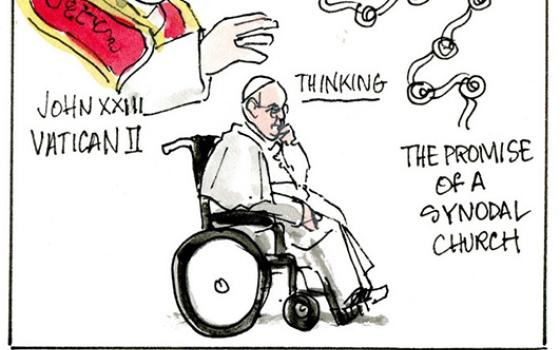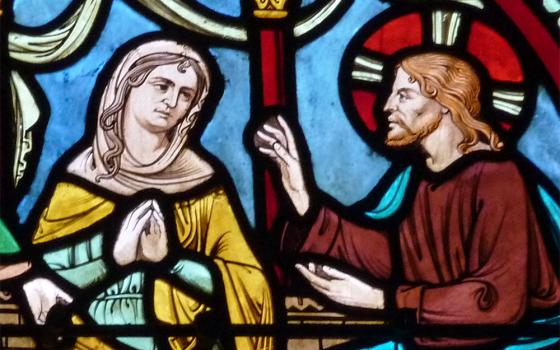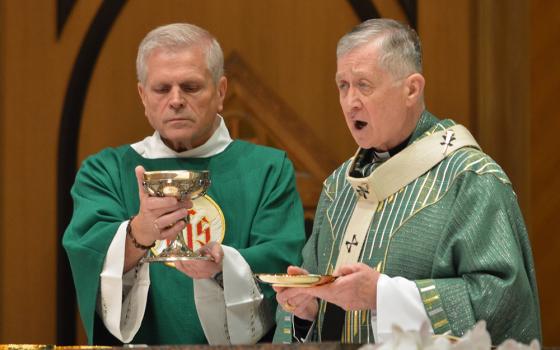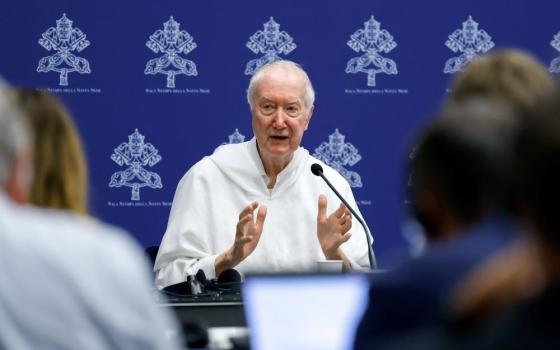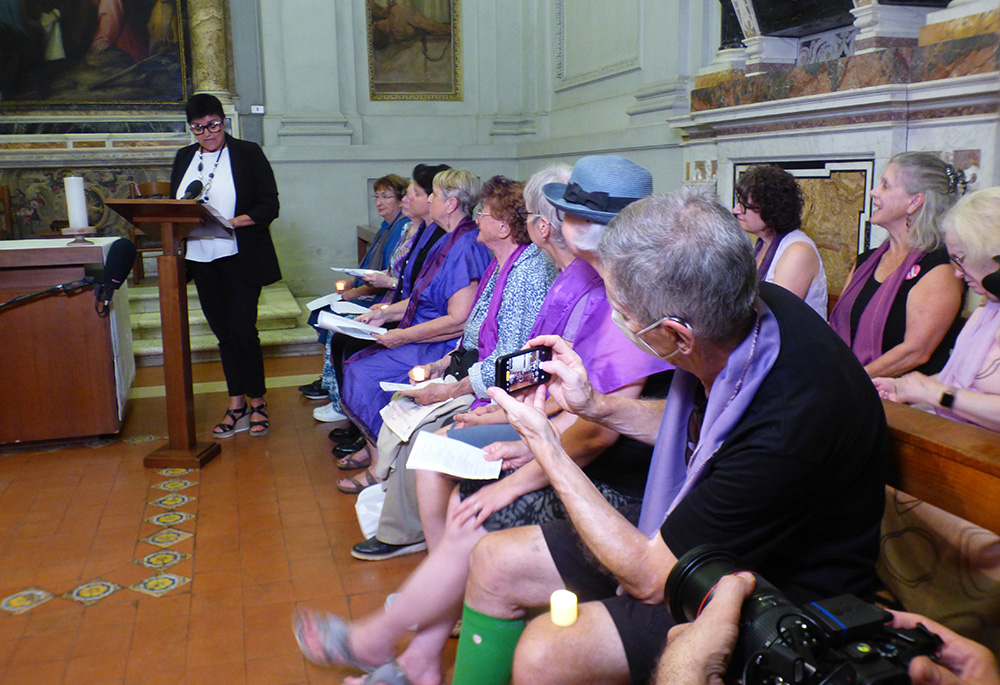
Patrizia Morgante, a member of the Italian group Donne per la Chiesa ("Women for the Church"), offers a testimony during the Oct. 3 "Let Her Voice Carry" prayer vigil hosted by women's ordination advocates at Rome's Basilica of Santa Praxedes. (NCR photo/Rhina Guidos)
Advocates for women's ordination in the Catholic Church hosted a prayer vigil at one of Rome's historic basilicas on Oct. 3, on the eve of Pope Francis' opening of a major Vatican summit expected to consider whether women might serve as Catholic deacons or priests.
About 40 women from various countries gathered at the Basilica of St. Praxedes, a ninth century church about a block away from the famous Basilica of St. Mary Major. The participants prayed together, sang and heard four testimonies focused on the unique struggles of women in the church.
One of the testimonies was given by Kate McElwee, executive director of the Women's Ordination Conference, which helped arrange the event. She said that while she initially had some skepticism about Francis' process for the Oct. 4-29 Synod of Bishops, she has "encouraged broad participation in the synod because I believe in it and want to believe in it."
The Basilica of St. Praxedes has a special meaning for many women's ordination advocates because of its Chapel of St. Zeno, which contains a ninth century mosaic image of Theodora, the mother of Pope Paschal I. The mosaic identifies the pope's mother as "Theodora Episcopa," using a term that is similar to the Greek term for "bishop."
During the vigil "Let Her Voice Carry," several women shared what they described as deep pain that they had experienced as women in the church.
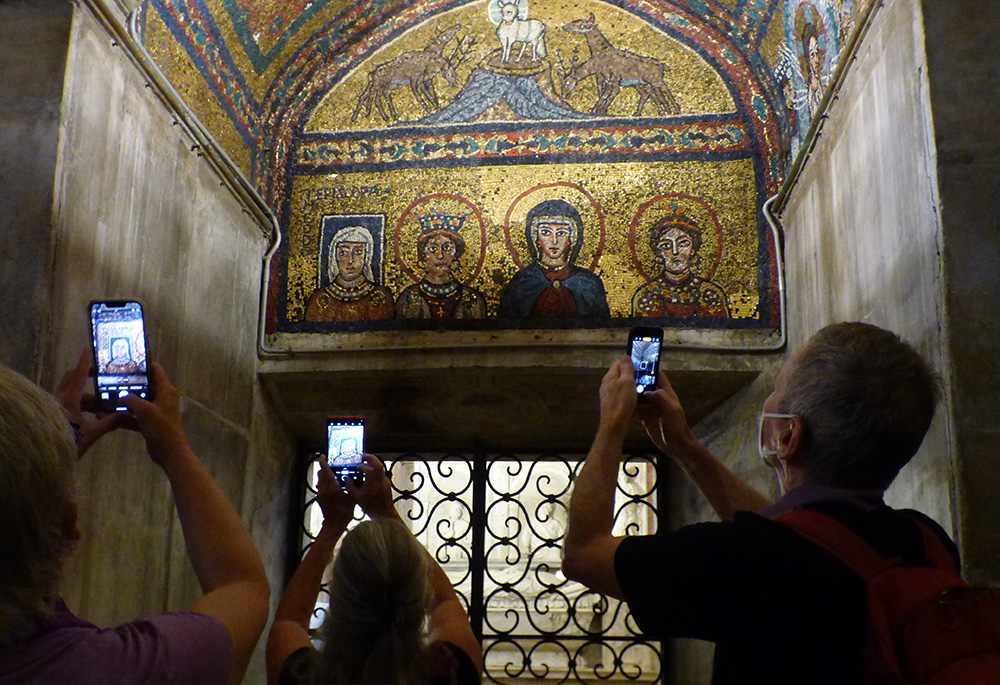
Participants in the Oct. 3 "Let Her Voice Carry" prayer vigil hosted by women's ordination advocates at Rome's Basilica of St. Praxedes take photos in the basilica's Chapel of St. Zeno. The mosaic pictured dates from the ninth century and contains, at far left, an image of Theodora, the mother of Pope Paschal I. The mosaic identifies her as "Theodora Episcopa." (NCR photo/Rhina Guidos)
Patrizia Morgante, a member of the Italian group Donne per la Chiesa ("Women for the Church"), said in her testimony that she has long lived hearing the church say to women: "You can say that, but …" or "you can dream, but …"
"I wondered to myself: How do all these 'buts' affect me?" said Morgante, who is also a former official at the International Union of Superiors General, or UISG, the Rome-based umbrella organization of Catholic sisters across the world.
Morgante told those attending the event that she did not feel full acceptance as a woman "with all my dimensions," and that she felt that being a woman was seen as an obstacle that doesn't allow her or other women to participate fully in the life of the church.
"All these 'buts' nurtured a sort of rage and anger," she said.
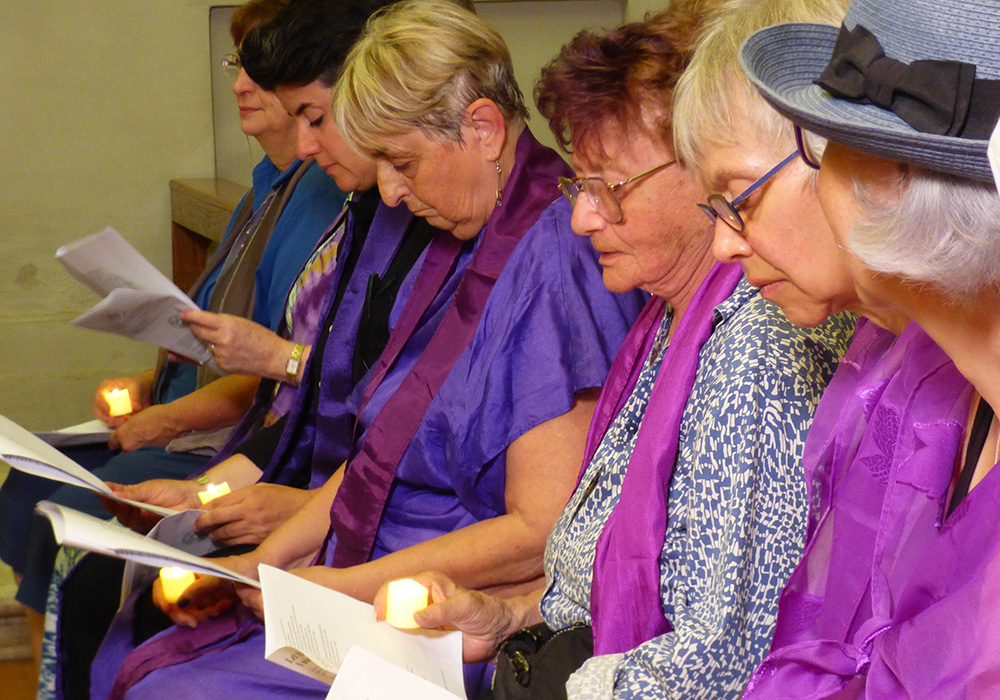
Participants in the Oct. 3 "Let Her Voice Carry" prayer vigil hosted by women's ordination advocates at Rome's Basilica of St. Praxedes. (NCR photo/Rhina Guidos)
Cathy Corbitt, an Australian and former Discalced Carmelite, told the group that "the administrative Catholic Church has ceased to be relevant to me in my relationship with God." But she said she still holds hope that the synod will produce something for those who want to stay, yet feel excluded from the life of the church.
"My hopes for the synod? That there are enough deeply prayerful members who will truly listen to the Spirit even if they go against the status quo of millennia," she said.
Jesus, she said, wanted a community of friends who would grow old in age and wisdom together, bear burdens together, surrender to God and drink from the living waters of grace.
"Will the synod move forward in that direction?" Corbitt asked. "We'll just have to hope and wait and see."
Advertisement
Jeanie McKibbon, a laywoman from Canada, told NCR she hoped other Catholics who disagree with the idea of women's ordination would understand the movement is not meant to insult others or to change the way that they encounter God in their daily lives.
"We certainly don't mean harm," she said, adding that she respects a variety of points of view and wants to be welcoming to those who don't feel welcome in the Catholic Church. "We mean no harm but we're trying to live out our baptismal call," she said.
Kathleen Gibbons Schuck, who has been ordained a priest as part of the Roman Catholic Womenpriests movement, echoed McKibbon's sentiment. She told NCR she wanted to support the dreams of those like Morgante, who expressed a desire to see if the institutional church might be able to change for the better.
"I still believe in church," Morgante said in her testimony. "I hope and dream of [a] church that is a safe space for women and men to express their full vocation as [witnesses] of Jesus."





